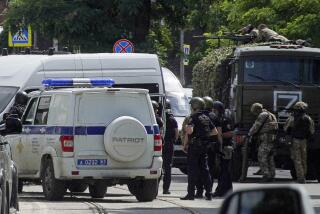24 Seek Damages in Deadly Raid at Moscow Theater
- Share via
MOSCOW — Some lost loved ones to suffocation from the incapacitating gas used to end a three-day hostage seizure by Chechen terrorists at a Moscow theater showing the musical “Nord-Ost.” Others were hostages who survived but have crippling disabilities, with little or no medical compensation.
Now, 24 plaintiffs, who have joined together to try to hold Russian authorities responsible for their actions ending the siege, fear that they are about to be victimized again, this time by a city bureaucracy and a justice system unwilling to hear their pleas for individual damages.
The Oct. 26 raid by the authorities led to 129 deaths among the more than 700 hostages. All but two of those who died succumbed to the effects of the anesthesia-like gas used by the rescuers. However, indications Wednesday were that Tverskoi District Judge Marina Gorbachev has no intention of allowing the tactics of the police and special forces to be put on trial.
Less than a week after the proceedings began last Thursday, Gorbachev was speaking curtly to the plaintiffs’ lawyers: pressing them to wrap up their case, dismissing a long list of proposed witnesses and refusing to hear any more evidence of plaintiffs’ physical complaints and mental anguish.
Final arguments were set for today, and the plaintiffs’ lead lawyer, Igor Trunov, said the judge might immediately rule. The speedy disposition appeared in keeping with the official attitude toward the deadly theater standoff, which many Russians compare to the shock endured by the United States after the Sept. 11 attacks.
Despite the high death toll, for many people the most important fact is that the security forces, faced with terrorists threatening to bring down the theater by detonating explosives wired to their bodies, managed to rescue the large majority of the hostages and kill all of the attackers. A parliamentary proposal for an investigation into actions of the security forces and medical services was swiftly dropped, and there has been little public appetite since to question the government’s tactics.
But among those who lost family members, or suffered debilitating injuries, there is a strong sense of outrage. “The court and the city authorities are doing all they can to keep a lid on things and not to allow the information about this trial to go any further than the courtroom,” said Nikolai A. Lyubimov, 71, one of the victims, who said he has lost use of his left hand and is partly paralyzed on the left side of his body from the gas and cannot afford the medicines he now needs.
“First we were taken hostage, then poisoned by some unknown agent, and now the authorities are trying to pretend that they have nothing to do with what happened,” he said.
Trunov, suing under a provision of Russia’s terrorism law that holds city authorities responsible for compensation to victims of terrorist attacks, complained that the judge had heard only 15 of the 24 plaintiffs and had denied their request to put in as evidence videotapes taken during and after the hostage crisis.
The lawyer acknowledged that the official mood is against the plaintiffs. He was labeled a “marauder” by state-owned television, he complained.
A bitter and frustrated Zoya Chernetsov, who lost her only son, Danila, in the police action, stood in the corridor outside a dingy courtroom after the judge dismissed most of the plaintiffs’ proposals for witnesses.
“They all say that they are not to blame,” Chernetsov said, referring to the city authorities. “But to me, and to anybody with a brain, it is clear that the safety of the hostages was never a priority -- the main goal was to destroy the terrorists. My son’s life and the lives of the other hostages didn’t matter, and this trial proves it once again.
“I have had to relive the agony of those days, and all I get in return is the total indifference of the authorities.”
Andrei Rastorguyev, the attorney sent to represent the Moscow city government, denied in an interview that the city is indifferent. But he said that under Russian law, the city cannot be held responsible for any errors that might have been made.
“We don’t consider ourselves the proper defendant,” he said. “The plaintiffs complain that mistakes were made in the organization of evacuation and medical first aid -- but we don’t think it is a matter of this particular trial. Especially since no court has established that negligence took place.”
So far, the city has given a social payment to the victims, amounting to about $3,000 for the families of those who died and $1,500 for those injured. But the plaintiffs said the sums were laughable in comparison with their suffering. They also argued that their main goal is to uncover why the city allowed so many of its citizens to die, and create pressure so that there is greater concern for individual lives.
“They put a price on my son’s life of 100,000 rubles, and they will not even bargain,” said Tatyana Karpov, who lost her son, Alexander, 31, the lyricist for the Russian version of the musical “Chicago.” “That is how much a human life is now worth in Russia -- less than a used car.”
More to Read
Sign up for Essential California
The most important California stories and recommendations in your inbox every morning.
You may occasionally receive promotional content from the Los Angeles Times.










